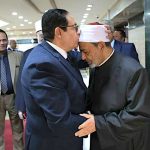By Coptic Solidarity –
Event Date: September 30, 2025
Hosted by: Coptic Solidarity
Location: Rayburn House Office Building – Room 2075
This congressional briefing brought together regional experts and advocates to address the ongoing threats to vulnerable religious and cultural communities in the Middle East. Speakers highlighted the persistent persecution of minorities, the failure of international and local institutions, and the manipulation of global norms by state and non-state actors. The briefing emphasized the urgent need for U.S. policy to protect these communities, enforce accountability, and preserve cultural heritage.
Dr. Marc Porter – case study on St. Catherine’s Monastery & letter from the Fathers who reside there. Dr. Porter discussed the historical, cultural, and geopolitical importance of the monastery in the Christian faith. He emphasized its unique heritage, manuscripts, icons, and its vulnerable position in a region of ongoing conflict and political contestation. Dr. Porter warned of the existential threat facing the world’s oldest continuously inhabited Christian monastery, emphasizing the legal and political pressures from the Egyptian government.
Key points included:
- Autonomy at Risk: Egypt’s bid to seize St. Catherine’s lands, relics, and library threatens the monastery’s 1,500-year independence and priceless heritage.
- Commercial Pressures: Plans for nearby luxury resorts prioritize profit over preservation, eroding the site’s sanctity and isolation.
- UNESCO Violations: These actions breach Egypt’s 2002 pledge to uphold the monastery’s autonomy, endangering global heritage protections.
- Cultural Control: Cairo’s campaign reflects broader efforts to centralize religious authority and exploit sacred sites for political gain.
- Accountability and Diplomacy: The U.S., EU, and UNESCO must demand transparency, oppose Egypt’s leadership bids, and pursue diplomatic action to protect St. Catherine’s as a shared sacred site for Jews, Christians, and Muslims.
Porter warned that without swift international action, Egypt’s encroachment could end St. Catherine’s 1,500-year autonomy and imperil one of Christianity’s holiest sites. He urged Congress to condemn Cairo’s violations, contest its UNESCO leadership bid, and back diplomatic efforts to safeguard the monastery’s protection, religious freedom, and monastic stewardship.
Ashuriena Abraham – Representative of the Indigenous Assyrians of Syria
Assyrians face a dual threat from both HTS-aligned extremist groups and Kurdish-led authorities in the Autonomous Administration of North and East Syria (AANES). While these regimes present themselves internationally as protectors, on the ground Assyrians endure land confiscation, school closures, church desecration, violence, and forced displacement.
Key points included:
- Extremist Violence: HTS and Saraya Ansar al-Sunnah target Assyrian communities through attacks and killings while projecting a moderate image internationally.
- Repressive Policies: AANES undermines Assyrian survival via school closures, property confiscations, and ideological curricula erasing cultural identity.
- Self-Determination and Local Governance: A locally administered Khabour Region with recognized autonomy, accountable security, and international oversight is essential for community stability, aligning with UN Indigenous rights standards.
- Protection of Minorities: Yazidis, Copts, Assyrians, Druze, and others face ongoing violence and displacement; U.S. policy must ensure tangible safeguards.
- Accountability and Justice: HTS and state actors like Egypt and AANES must be held responsible for violence, discrimination, and heritage destruction.
- Heritage Preservation: UNESCO and international bodies must protect cultural sites, resist politicization, and uphold global heritage standards.
- Conditional Aid: U.S. support should depend on measurable progress in human rights, security, reparations, and cultural preservation.
Abraham stressed that international support must be based on action, not words, ensuring accountability, justice, and protection before these communities are fully erased.
Amal Esmail – Alawites Association of the United States
Alawites and other religious minorities in Syria—Christians and Druze—face systematic violence under HTS, which seized power in December 2024. Families, religious leaders, and communities were massacred; churches and shrines destroyed. Over 1,700 Alawites were killed along the coast. Many, including Esmail’s family, fled while neighbors were murdered, valuables seized, and survivors were forced into brutal circumstances. The Syrian government has covered up these atrocities, discarding bodies at sea, and choosing silence over justice.
Key points included:
- HTS: Coordinated attacks on Alawite and Christian villages, targeted killings of civilians and clergy. HTS enables these extremist factions while maintaining a false image of moderation to the international community, blatantly violating international law .
- Systematic Abductions and Gender-Based Violence: Reports of Alawite women and girls being abducted, assaulted, and forcibly displaced underscore the urgent need for protection and international monitoring.
- Urgent Need for Self-Determination and Protection: Called for the establishment of internationally monitored safe zones in coastal regions and the recognition of the Alawite community’s right to self-determination and protection under international law.
Esmail stressed that silence in the face of these atrocities enables further erasure and injustice. She urged the U.S. Congress to condemn HTS-led violence, demand independent investigations, and provide humanitarian aid and resettlement pathways for persecuted Alawite and other minority families.
Jamil Ammar, Ph.D. – “The Deception Game: The Hyena That Turned Vegetarian”
Ammar analyzed Hay’at Tahrir al-Sham (HTS), demonstrating how it transformed from an Al-Qaeda affiliate to Syria’s de facto governing power while projecting a false image of moderation.
HTS Atrocities and Deceptive Strategy: HTS has carried out coordinated attacks on Alawite and Christian villages, killing civilians and clergy while enabling extremist factions and maintaining a false image of moderation—a clear violation of international law.
HTS’s Four-Phase Strategy: From mastering propaganda under al-Qaeda to rebranding after its ISIS split, HTS has sought legitimacy through image control. Its 2024 “reform” campaign projected moderation, but ongoing atrocities—most notably the July 2025 Sweida massacre (1,000+ killed, 100+ women abducted)—expose its continued extremism.
Key points included:
- Gender-Based Violence: Systematic abductions and assaults on Alawite women demand international monitoring and protection.
- Self-Determination: Internationally monitored safe zones are needed to secure Alawite civilians and uphold their right to self-governance.
- Minority Protection: Alawites, Druze, Christians, and others face escalating violence and cultural erasure; U.S. policy must ensure tangible safeguards.
- Accountability: HTS and complicit Syrian officials must be investigated for crimes against humanity, including mass killings and heritage destruction.
- Cultural Preservation: UNESCO and partners must protect endangered shrines and religious sites, maintaining impartiality and global heritage integrity.
Ammar warned that HTS’s successful deception sets a dangerous precedent for other extremist groups and confuses international policy, emphasizing the need for accountability despite HTS’s public image.
Caroline Doss, JD – President, Coptic Solidarity
Doss highlighted the dangers of politicizing UNESCO and using international institutions to legitimize state abuses. Egypt’s nomination of former Minister of Antiquities Khaled El-Enany for UNESCO Director-General exemplifies the problem.
Key concerns included:
- St. Catherine’s Monastery: Egypt’s efforts to seize control violate its 2002 UNESCO commitments; the Ministry of Antiquities, under El-Enany, supported these actions.
- Heritage Mismanagement: Projects such as the demolition of historic cemeteries and controversial restorations reflect priorities of control over preservation.
- Sectarian Education Policies: Egypt’s dual-track system and religious grading policies entrench inequality and segregation.
- Systemic Cultural Suppression: Restrictions on church construction, interference in monasteries, and press freedom violations highlight systemic discrimination against Copts.
Doss urged the US State Department to oppose Egypt’s UNESCO candidacy, insist on international arbitration for St. Catherine’s Monastery, and stand with Coptic Christians. UNESCO leadership must defend culture, not enable heritage erasure.
Jamileh Naso (Remarks delivered on behalf of the Canadian Yazidi Association)
The Yazidi genocide of 2014 remains unresolved. Over 200,000 Yazidis are still displaced, 2,700 women and girls remain missing, and 87 cultural and religious sites were destroyed. Policies intended to provide relief—the 2020 Sinjar Agreement and the 2021 Iraq Yazidi Survivors Law—have largely failed.
Key recommendations included:
- Inclusive Governance: Replace the Sinjar Agreement with a representative framework that includes elected Yazidi leaders, neutral security forces, and clear, measurable benchmarks for implementation.
- Conditional U.S. Support: Tie U.S. assistance to full enforcement of the Yazidi Survivors Law, transparent reparations, and the expansion of trauma-informed services and reintegration programs.
- Accountability for Atrocity Crimes: Officially recognize sexual violence and forced conversion as atrocity crimes, prompting sanctions, visa bans, and international accountability measures.
- Heritage Protection and Justice: Safeguard Yazidi cultural heritage and ensure preservation of evidence of ISIS crimes for future prosecutions.
- Resettlement and Reunification: Expand resettlement opportunities and family reunification programs to support survivors and strengthen community recovery.
Naso stressed that success should be measured by concrete outcomes: families safely reunited, survivors compensated and treated, children back in school, and perpetrators prosecuted.
Conclusion
The briefing emphasized that survival for Middle Eastern minorities requires more than sympathy; it demands decisive U.S. and international action. Advocates urged Congress and policymakers to:
- Condition aid on accountability and cultural protection;
- Oppose candidates for international posts who enable persecution;
- Recognize the deceptive tactics of extremist groups; and
- Support autonomy and self-determination for communities under existential threat.
The overarching message was clear: without action, violence, displacement, and erasure will continue—while impunity and international inaction will embolden both state and non-state perpetrators.





